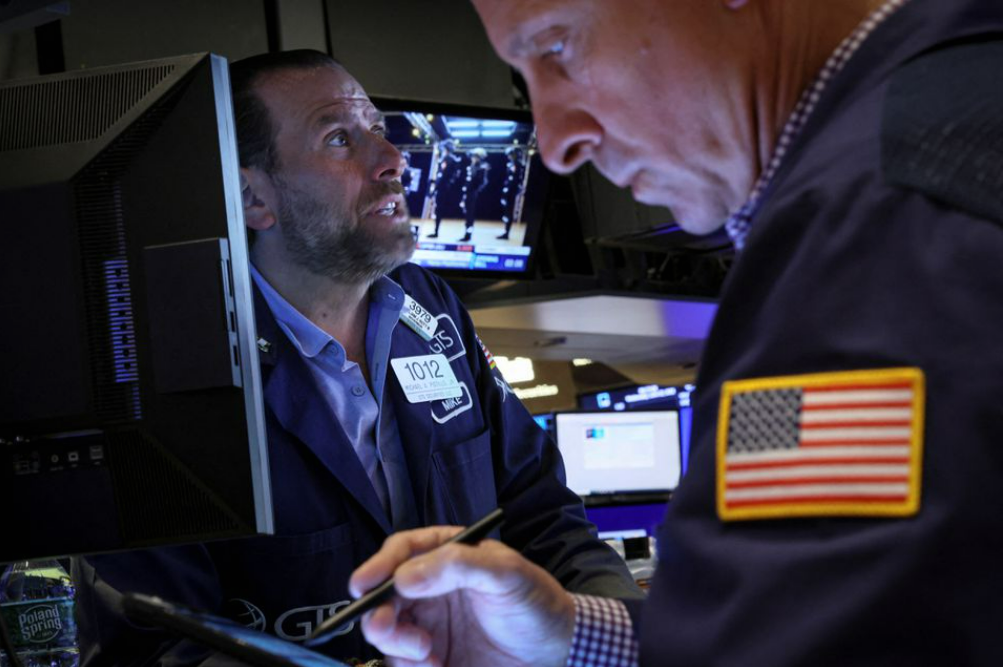WALL Street ended in negative territory on Tuesday as growing signs of recession kept buyers out of the equities market ahead of inflation data.
While all three major US stock indexes seesawed between modest gains and losses earlier in the session, they turned sharply lower late in the day as Wednesday’s Consumer Prices report from the Labour Department drew near with big bank earnings looming later in the week.
The Dow Jones Industrial Average fell 192.51 points or 0.62% to 30,981.33, the S&P 500 lost 35.63 points or 0.92% to 3,818.8 while the Nasdaq Composite dropped 107.87 points or 0.95% to 11,264.73.
“(Investors are) waiting to hear what happens with CPI and earnings,” said Brent Schutte, chief investment officer at Northwestern Mutual Wealth Management Company, in Milwaukee, Wisconsin. “For several months we’ve swung back and forth between inflation fears and recession fears, almost on a daily basis.”
“We have really confused investors who have chosen to go on a buyers strike,” Schutte added. “I don’t hear many people saying ‘buy the dip’.”
While the CPI report is expected to show inflation gathered heat in June, the so-called “core” CPI which strips away volatile food and energy prices is seen offering further confirmation that inflation has peaked which could potentially convince the Federal Reserve to ease on its policy tightening in autumn.
Paul Kim, CEO at Simplify ETFs in New York, expects year-on-year topline CPI to “be in the high eight or potentially even nine percentage range and with inflation that high, the Fed has only one thing in mind”.
Worries that overly aggressive moves by the Fed to reign in decades-high inflation could push the economy over the brink of recession were exacerbated by the steepest inversion of the two-year and 10-year Treasury yields since at least March 2010, a potential signal of near-term risk and economic contraction.
The market expects the central bank to raise the key Fed funds target rate by 75 basis points at the conclusion of its July policy meeting which would mark its third consecutive interest rate hike.
All 11 major sectors in the S&P 500 fell with energy shares weighed down by plunging crude prices, suffering the largest percentage loss.
The second-quarter reporting season will hit full stride later in the week as JPMorgan Chase & Co, Morgan Stanley, Citigroup and Wells Fargo & Co post results.
As of Friday, analysts saw aggregate annual S&P earnings growth of 5.7% for the April to June period, down from the 6.8% forecast at the beginning of the quarter, according to Refinitiv.
PepsiCo got the ball rolling this week by beating its quarterly earnings estimates and announced it could increase prices amid resilient demand.
Shares of Boeing Co jumped 7.4% after the plane maker’s June aircraft deliveries hit the highest monthly level since March 2019. That news, along with falling energy prices, helped the S&P 1500 Air Lines index rise 6.1%.
Declining issues outnumbered advancing ones on the NYSE by a 1.37-to-1 ratio; on Nasdaq, a 1.19-to-1 ratio favoured decliners.
The S&P 500 posted one new 52-week high and 30 new lows; the Nasdaq Composite recorded 13 new highs and 145 new lows.
Volume on US exchanges was 9.86 billion shares compared with the 12.79 billion average over the last 20 trading days. – July 13, 2022









